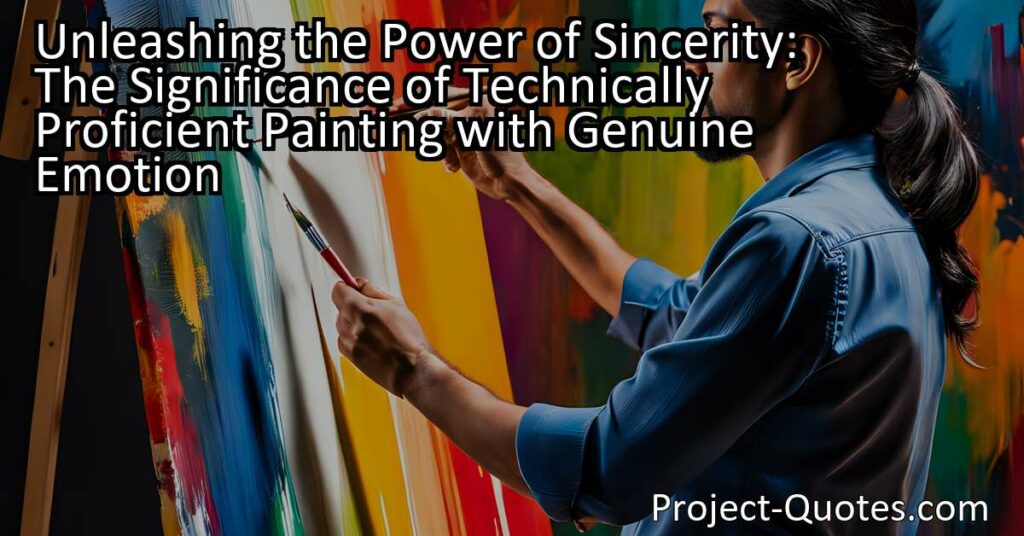All that is necessary to paint well is to be sincere.
Maurice Denis
Unleashing the Power of Sincerity: The Significance of Technically Proficient Painting with Genuine Emotion Discover the profound significance of sincerity in the art of painting. While technical skill is important, Maurice Denis reminds us that without sincerity, even the most technically proficient painting may feel empty or uninspiring. Embrace your true thoughts and emotions to create artwork that forges a genuine connection with the viewer.
Table of Contents
Meaning of Quote – All that is necessary to paint well is to be sincere.
Have you ever looked at a beautiful painting and wondered how the artist was able to create such a captivating piece? While it may seem like an unattainable skill, renowned artist Maurice Denis once said, “All that is necessary to paint well is to be sincere.” This quote suggests that the key to producing exceptional artwork lies not in technical abilities or years of training, but instead in the artist’s ability to express their true thoughts and emotions honestly. In this exploration, we will delve deeper into Denis’ quote and uncover the significance of sincerity in the art of painting.
To understand the profound meaning behind Denis’ quote, we must first grasp the concept of sincerity. Sincerity, in this context, refers to the artist’s genuine and heartfelt expression of their inner self through their artwork. It encompasses the artist’s ability to convey their true thoughts, emotions, and experiences onto the canvas, without pretense or imitation. By being sincere, an artist takes an authentic and unique approach to their work, resulting in a personal and genuine connection between the artist, their creation, and the viewer.
The significance of sincerity in painting can be observed throughout history. Many celebrated artists, such as Vincent van Gogh, Frida Kahlo, and Claude Monet, achieved greatness through their sincere approach to art. Take van Gogh, for example, whose vivid and emotionally charged paintings such as “Starry Night” and “Sunflowers” reflect his passionate and turbulent inner world. Despite facing numerous challenges in his personal life, van Gogh’s sincerity enabled him to create artworks that continue to captivate and move audiences worldwide.
Sincerity allows an artist to transcend mere technical skill and create something truly meaningful. It empowers them to communicate their message effectively and stir emotions within the viewer. When an artist is sincere, the viewer can sense the artist’s intentions and connect with the artwork on a deeper level. This connection is what often distinguishes extraordinary paintings from mere imitations or superficial creations.
Furthermore, sincerity in painting is closely intertwined with self-expression. Art serves as a medium through which artists can freely express their thoughts, feelings, and experiences. By embracing sincerity, artists can channel their individuality and unique perspective into their work, allowing them to create something that is distinctly theirs. Each stroke of the brush becomes a manifestation of the artist’s identity, making the artwork more personal and relatable for both the creator and the audience.
Moreover, sincerity allows an artist to break free from societal expectations and conventional norms. In a world that often pressures individuals to conform, art provides an avenue for self-discovery and self-acceptance. By embracing their true selves through sincerity, artists can challenge existing norms, push boundaries, and celebrate their individuality. This defiance of societal expectations is what often leads to the creation of groundbreaking and transformative artwork.
It is important to note that sincerity in painting does not imply a lack of technical skill or knowledge. Mastery of foundational techniques, such as color theory, composition, and brushwork, remains essential for artists to effectively convey their sincere expression. However, Denis suggests that technique alone is insufficient to create exceptional artwork. Without sincerity, even the most technically proficient painting may feel empty or uninspiring, lacking the depth and emotional resonance that comes from genuine self-expression.
To cultivate sincerity in painting, artists must embark on a journey of self-reflection and introspection. They must be willing to explore their innermost thoughts, fears, joys, and vulnerabilities in order to authentically convey these experiences through their art. This process requires honesty, vulnerability, and a willingness to embrace imperfections. By acknowledging and embracing their true selves, artists can infuse their work with sincerity, forging a genuine connection with the audience.
In conclusion, Maurice Denis’ quote, “All that is necessary to paint well is to be sincere,” reminds us of the importance of sincerity in the art of painting. Sincerity allows an artist to express their genuine thoughts and emotions, creating a personal and powerful connection with the viewer. Throughout history, many great artists have exemplified the significance of sincerity in painting, enabling them to create lasting and impactful artwork. By embracing sincerity, artists can break free from societal expectations, celebrate their individuality, and communicate their message effectively. While technical skill is crucial, sincerity adds a layer of depth and emotional resonance that elevates artwork to a level of greatness. So, the next time you pick up a paintbrush, remember the power of sincerity and allow your true thoughts and emotions to guide your artistic journey.
I hope this quote inspired image brings you hope and peace. Share it with someone who needs it today!


